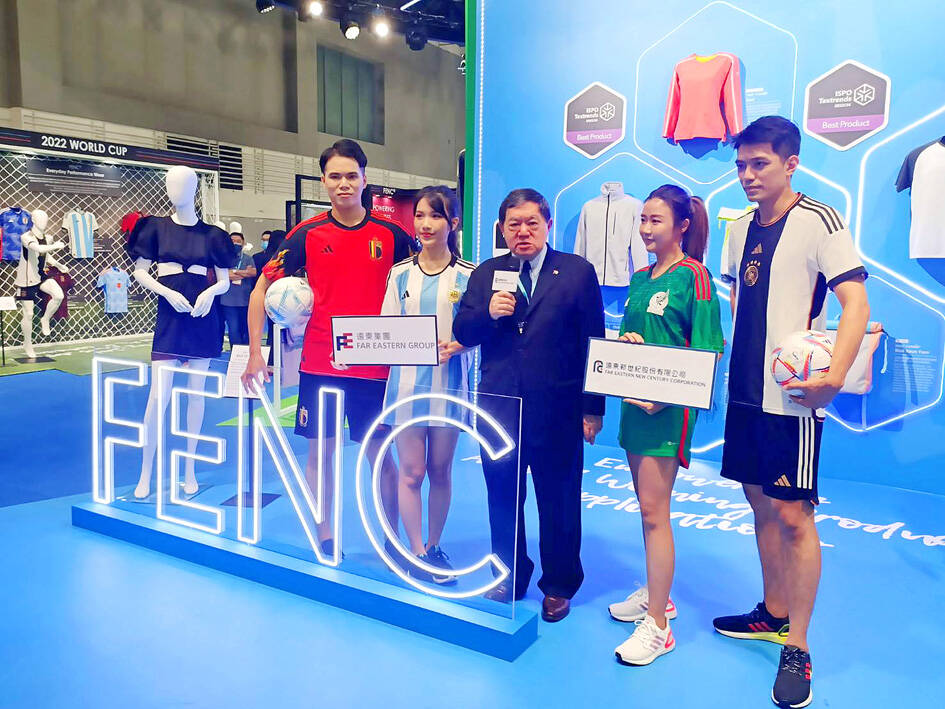More Taiwanese textile manufacturers are joining the trend to develop recycled products as the EU pushes the implementation of its “Strategy for Sustainable and Circular Textiles” in 2024, and the global textile sector targets a 45 percent reduction in carbon emissions by 2030.
Several local firms, which displayed environmentally friendly products at the Taipei Innovative Textile Application Show earlier this month, have followed in the footsteps of other global brands to incorporate environmental, social and corporate governance principles into their business operations in response to the UN’s Sustainable Development Goals.
The companies include Far Eastern New Century Corp (FENC, 遠東新世紀), Shinkong Synthetic Fibers Corp (新光合成纖維), Lealea Enterprise Co (力麗), Zig Sheng Industrial Co (集盛實業) and Formosa Taffeta Co (福懋興業), according to the trade show’s organizer, the Taiwan Textile Federation.

Photo: Huang Hao-chen, Taipei Times
Yuanta Securities Investment and Consulting Co (元大投顧) said in a note on Thursday that recycled polyethylene terephthalate (R-PET) demand has been increasing, with prices rising three times higher than those of virgin materials, as global brands such as Nike Inc and Adidas AG have pledged to use sustainable and recycled materials for their products.
R-PET is made mainly from plastic bottles, which are then made into a resin to be used in the production of textiles. The world’s three largest R-PET suppliers are Thailand-based Indorama Ventures Holdings LP, Taiwan’s Far Eastern New Century and Mexico-listed Alpek SAB de CV, Yuanta said.
To meet strong demand, Indorama plans to expand its R-PET capacity by 94 percent to 750,000 tonnes by 2025, from 387,000 tonnes, while Far Eastern is looking to increase its capacity by 169 percent to 870,000 tonnes from 324,000 tonnes over the same period, while also launching a plastic bottle recycling project with convenience stores in Japan and Taiwan, Yuanta said.
“FENC has focused on research and development for eco-friendly materials for years. It supplies multiple PET, textile and apparel products for international brands,” Yuanta analysts led by Lisa Chen (陳玫芬) said in the note.
The Taipei-based company has been supplying R-PET for Nike’s sports jerseys for national teams for more than 10 years.
FENC also used plastic bottles retrieved from the sea to produce sports shoes for Adidas in 2015, and is to extend the collaboration to sportswear this year.
The two companies are working to provide tear-resistant sports jerseys for nine national teams at this year’s FIFA World Cup in Doha, Qatar, as the shirts are moisture-wicking and suitable for sports involving collision, Yuanta said.
Supplying Lululemon Athletica Inc and Inditex SA’s Zara brand, FENC used recycled polyester chips in their products this year, which would also be adopted for their products to be launched next year, it said.
Shinkong Synthetic, Lealea and Zig Sheng purchase PET bottle flakes to make R-PET, which is used to manufacture recycled polyester fiber.
Formosa Taffeta purchases recycled polyester fiber to make fabric, with R-PET accounting for 50 percent of its total PET shipments, while used fishing nets and oyster ropes make up 20 percent of its total nylon shipments, Yuanta said.
“Taiwanese suppliers should continue to benefit from the eco-friendly approach of apparel brands like Nike, Adidas and Lululemon,” Yuanta analysts said.

Macronix International Co (旺宏), the world’s biggest NOR flash memory supplier, yesterday said it would spend NT$22 billion (US$699.1 million) on capacity expansion this year to increase its production of mid-to-low-density memory chips as the world’s major memorychip suppliers are phasing out the market. The company said its planned capital expenditures are about 11 times higher than the NT$1.8 billion it spent on new facilities and equipment last year. A majority of this year’s outlay would be allocated to step up capacity of multi-level cell (MLC) NAND flash memory chips, which are used in embedded multimedia cards (eMMC), a managed

In Italy’s storied gold-making hubs, jewelers are reworking their designs to trim gold content as they race to blunt the effect of record prices and appeal to shoppers watching their budgets. Gold prices hit a record high on Thursday, surging near US$5,600 an ounce, more than double a year ago as geopolitical concerns and jitters over trade pushed investors toward the safe-haven asset. The rally is putting undue pressure on small artisans as they face mounting demands from customers, including international brands, to produce cheaper items, from signature pieces to wedding rings, according to interviews with four independent jewelers in Italy’s main

CULPRITS: Factors that affected the slip included falling global crude oil prices, wait-and-see consumer attitudes due to US tariffs and a different Lunar New Year holiday schedule Taiwan’s retail sales ended a nine-year growth streak last year, slipping 0.2 percent from a year earlier as uncertainty over US tariff policies affected demand for durable goods, data released on Friday by the Ministry of Economic Affairs showed. Last year’s retail sales totaled NT$4.84 trillion (US$153.27 billion), down about NT$9.5 billion, or 0.2 percent, from 2024. Despite the decline, the figure was still the second-highest annual sales total on record. Ministry statistics department deputy head Chen Yu-fang (陳玉芳) said sales of cars, motorcycles and related products, which accounted for 17.4 percent of total retail rales last year, fell NT$68.1 billion, or

In the wake of strong global demand for AI applications, Taiwan’s export-oriented economy accelerated with the composite index of economic indicators flashing the first “red” light in December for one year, indicating the economy is in booming mode, the National Development Council (NDC) said yesterday. Moreover, the index of leading indicators, which gauges the potential state of the economy over the next six months, also moved higher in December amid growing optimism over the outlook, the NDC said. In December, the index of economic indicators rose one point from a month earlier to 38, at the lower end of the “red” light.